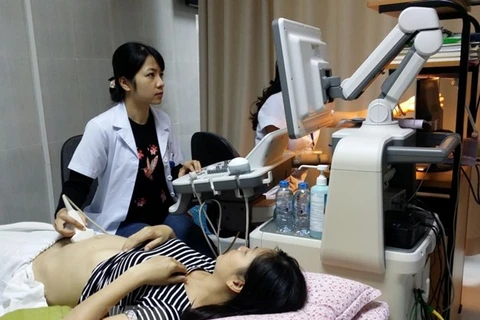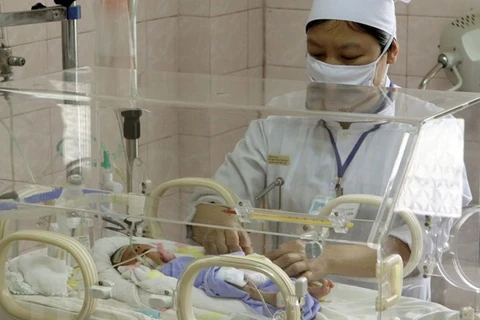 A medical staff is carrying out neonatal heel prick to take blood samples that are tested for rare genetic conditions. (Photo: VNA)
A medical staff is carrying out neonatal heel prick to take blood samples that are tested for rare genetic conditions. (Photo: VNA) Hanoi (VNA) – Since 2006, the Ministry of Health has carried out prenatal and newborn screening, diagnosis, and treatment of some diseases and disorders to help reduce costs and improve the health of the future population.
According to Pham Hong Quan, Deputy Director of Department of Population Structure and Quality, General Department of Population and Family Planning under the Ministry of Health, the Prime Minister in December 2020 approved a programme on expanding the provision of prenatal and newborn screening, diagnosis, and treatment of some diseases and disorders until 2030.
The programme was carried out nationwide in more than 10,000 districts and communes. District-level health units have performed prenatal screening using ultrasound techniques while commune-level medical stations have carried out neonatal heel prick to take blood samples that are tested for rare genetic conditions.
The ratio of pregnant women that received prenatal tests increased from 20% in 2016 to 56.43% in 2019 while the ratio of newborn babies that underwent screening tests rose from 23% to 40% in the same period.
Quan acknowledged that the implementation of the programme not only brings humanitarian value as it helps to prevent grave consequences in both the mental and physical development of children, but also reduces social financial burden significantly associated with the cost of future treatments.
However, the programme has faced many difficulties, especially in ethnic minority and mountainous areas. A research project on “Exploring barriers to accessing maternal health and family planning services in ethnic minority communities in Viet Nam”, supported by the Ministry of Health and the United Nations Population Fund (UNFPA) in Vietnam, and the University of Toronto showed the ratio of ethnic minority women accessing prenatal services or having prenatal check-ups at least four times during pregnancy (16%) was 58 percentage points lower than the national ratio (74%), revealing newborn screening is neglected in ethnic communities.
Quan said that low awareness, especially in ethnic minority areas, about benefits of pre-marital counseling and health examination, prenatal, newborn screening, poor service delivery network in far-flung areas, and insufficient funds have hindered the efficiency of the programme.
Quan reckoned that prenatal, newborn screening activities have been implemented nationwide, however, there are many challenges in maintaining and promoting the results of the programme.
Regarding the service network development, Quan said that it is necessary to expand the capability to access quality services among people. He also suggested more investment in the network while bolstering the types of services provided by public and non-public health facilities based on the needs of each target group and each locality.
The programme on expanding the provision of prenatal and newborn screening, diagnosis, and treatment of some diseases and disorders until 2030 looks to provide premarital health consultancy and check-ups to 90% of couples while reducing the number of consanguineous marriages by 60%.
It aims to have 70% of pregnant women screened for at least four of the most popular congenital diseases and disorders, and 90% of newborn babies screened for at least five of the most common congenital health problems in the next 10 years.
Under this programme, facilities supplying premarital health advice and examinations, as well as prenatal and newborn screening, will be set up in 90% of the communal-level localities nationwide. Prenatal and newborn screening and diagnosis facilities will also be developed at obstetric and paediatric hospitals and general hospitals in 56 provinces and cities.
By 2025, five regional screening and diagnosis centres will be upgraded, and two new similar centres will be built in the northern midland and mountainous region and the Central Highlands.
The programme also expects three prenatal and newborn screening and diagnosis sites at existing medical establishments will reach ASEAN levels in the next five years./.
[Prenatal, new-born screening improves population health]





















